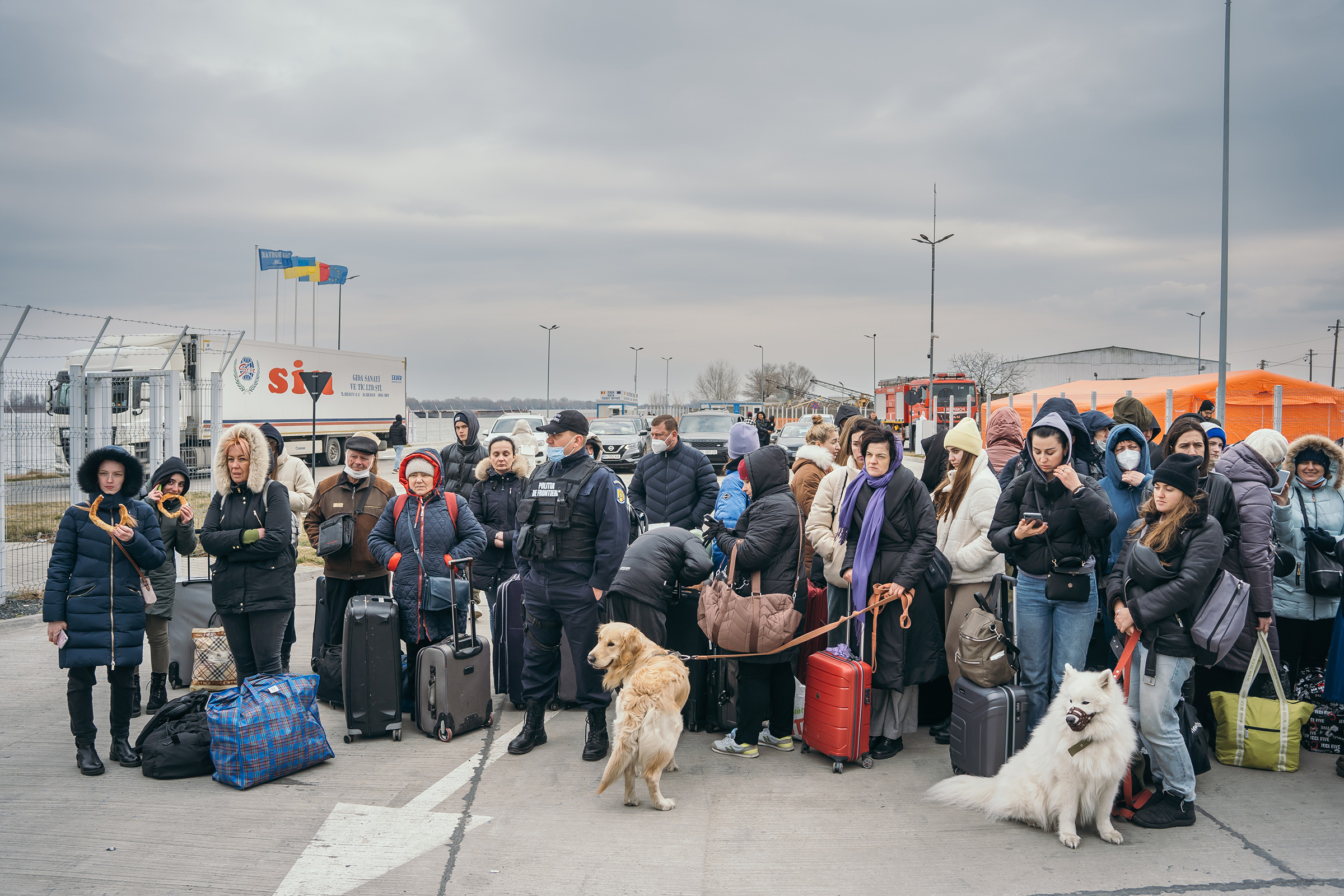The fortunate arrive by car, the less so on foot, wrapped in blankets against the freezing temperatures, clutching bundled possessions from a homeland besieged.
The exodus of refugees from war-torn Ukraine continued Sunday into neighboring eastern European countries, mainly women leading children by the hand and infants in strollers. Some even had pets in tow.
They leave behind men aged between 18 to 60, who have been summoned to defend their sovereign nation of 44 million people. Ukraine was invaded by Russian forces on Thursday on the orders of Russian President Vladimir Putin, who on Sunday, reportedly put his nuclear deterrent on “special alert.”
At least 368,000 Ukrainian refugees have already arrived in neighboring countries, the U.N.’s refugee agency posted on Twitter Sunday, more than double the agency’s estimate from the previous day.
Read More: Here’s What You Can Do to Help People in Ukraine Right Now
“I arrived at the border at four o’clock in the morning and the queue was three or four kilometers long,” Xenia Luchina, 43, from the Ukrainian city of Chernivtsi tells TIME at the Romanian frontier town of Siret. “There wasn’t fighting when I left but it was getting closer and you just don’t know what will happen tomorrow.”
Half of all Ukrainian refugees have crossed into Poland, while tens of thousands have also traveled to Hungary, Moldova and Romania, U.N. High Commissioner for Refugees Filippo Grandi tweeted Saturday. U.N. aid agencies have warned as many as 5 million people could flee the country as fuel, cash and medical supplies in Ukraine dwindle. The U.N. and other agencies have said it’s difficult to confirm numbers because it’s impossible to move around safely in many parts of the country.
At Siret, a normally sleepy border crossing flanked by fields of wheat and potatoes, many arrivals were not Ukrainian citizens but bewildered foreign nationals caught up in the crisis. TIME met scores of desperate Indians, Hungarians and Africans trying to find a way to safety.
Trevor, 23, from Zimbabwe, had been studying pharmacy in the Ukraine city of Vinnytsia for four years when his world turned upside down. “We were scared that the Russians would move in so we fled,” he says, sitting on a sleeping bag by the side of the road. “Ukraine is my second home. It’s really sad to see what’s happening.”
Authorities in the nearby Romanian city of Suceava had moved quickly to set up mobile camps with tents, beds and electricity. Mothers with young children are being cared for at local monasteries. But the vast majority of help has been provided by ordinary Romanians aghast at the crisis that has unfolded so quickly across the border.

At the Siret border crossing, volunteers in hi-vis vests held up signs: “Offer transport four persons,” “Free legal counselling for asylum procedures;” and simply “help on offer here.” Food trucks handed out steaming cups of coffee and soup. Thick ham and cheese sandwiches wrapped in aluminum foil and bags of groceries were handed to all trundling past. And online, Facebook groups are filled with people offering to meet new arrivals and provide shelter to those with nowhere else to go.
Antonina Venzhynovych, 25, a copywriter from Kyiv, arrived in Romania just before the Russian invasion and has come back to the border to help new arrivals by offering local SIM cards and help opening bank accounts. “A lot of people don’t know what to do and are just hoping to return home soon,” she says. “We need help because our people are dying.”
When I headed back to meet my taxi driver, he revealed that he’d spent the interim hours transporting three refugees back to his own home, where his wife had provided a hot meal and shelter. “It’s the least we can do,” he says. “They plan to travel to Italy tomorrow.”
Matei Vrabie, 24, political science student in the Romanian university city of Cluj-Napoca, drove five hours to Siret to help a group of medical students. He then agreed to drive them another six hours to the capital, Bucharest. “It’s our duty to help,” he says. “It’s in our DNA.”
Despite Romania’s warm welcome, most refugees TIME encountered were preparing leave Romania for third countries in the West—their priority to earn money to support their families and the fight against Russian invaders.
“I’m going to find work in Germany so I can send money back to my family in Ukraine,” says Illia Vladiian, 30, a plasterer and interior decorator who had been excused from military service for health reasons. “NATO needs to send more armaments to Ukraine because right now Russia is too strong.”
Read More: Russia’s Invasion of Ukraine May Trigger a Refugee Crisis. Here’s How the World Is Preparing
Vrabie said he was relieved that Romania is a part of the E.U. and member of NATO. “If not for that, I think Russia could be here in any moment.” On Sunday, Germany also pledged a massive hike in defence spending to meet the NATO spending target of 2% of GDP.
Romanian Defense Minister Vasile Dîncu told local media Thursday that the nation was “in a state of vigilance,” adding that there may be an increase in NATO forces on Romanian territory depending on how the situation changes. “We must make these preparations for any situation.”
How many more refugees will come is anyone’s guess. On Sunday, Ukrainian President Volodymyr Zelensky said Ukrainian officials would meet with Russian counterparts on the Ukrainian-Belarusian border, near the Pripyat River, for talks “without preconditions.”
More Must-Reads from TIME
- Cybersecurity Experts Are Sounding the Alarm on DOGE
- Meet the 2025 Women of the Year
- The Harsh Truth About Disability Inclusion
- Why Do More Young Adults Have Cancer?
- Colman Domingo Leads With Radical Love
- How to Get Better at Doing Things Alone
- Michelle Zauner Stares Down the Darkness
Write to Charlie Campbell / Siret, Romania at charlie.campbell@time.com